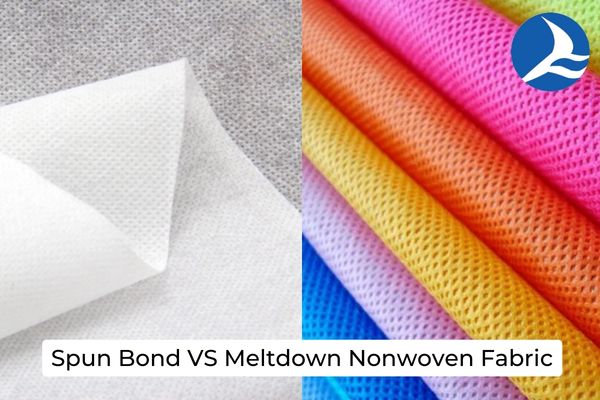When the COVID-19 epidemic broke out, people knew about masks. Everyone knows that masks are made of non-woven materials. But most people don’t know the type of materials in the mask. The medical mask is composed of three layers of cloth. The top and back are made of spunbond. But, the middle layer is made of melt-blown nonwoven. They have different antivirus functions. But most people don’t know the difference between them. Here, in this article, we will discuss the question, what is the difference between spunbond and meltblown?
Spunbond Nonwoven Fabric
Spunbond non-woven fabric is produced using a continuous fiber-spinning process. The polymer is extruded and stretched to form fibers. The lines are arranged with a net. The tissues are then self-connected through thermal, chemical, or mechanical treatment. Here, the reinforcement turns the web into a nonwoven fabric.

Non-woven spunbond applications include non-woven bags, adapters, medical overalls, masks, and filters. It is becoming more and more popular in the hygiene and treatment industries.
Meltblown Nonwoven Fabric
The melt-blown process involves converting polymer chips into web fabric. The PP melt can be spun after being extruded, filtered, and pumped. The hot air then blows the fibres out of the melt-blown nozzle.

The fibers form an interwoven fiber network. After cooling and heat pulverization, melt-blown wool is obtained. Compared with other systems, this simple processing method has obvious cost advantages.
Difference Between Spunbond and Meltblown:
Spunbond is easy to break. In addition, it is moisture-proof, breathable, flexible, light, and non-flammable. Today, more and more people use spunbond fabrics instead of plastics. Because they are non-toxic, non-irritating, environmentally friendly, and recyclable, also, it is reasonable in price and rich in colors.
On the other hand, Meltblown cloth is three-fifths of lightweight cotton. It is soft and pleasant to the touch. The meltblown cloth is waterproof, breathable, and non-absorbent. The most important thing is that the melt-blown cloth should have good filterability. Medical masks are in great demand.

Another key difference between spunbond and melt-blown is the nozzle assembly. In the melt-blowing process, when the fibres leave the spinneret, hot air converges on the threads, and during the spinning process, the hot air flows through the leaving threads. The convergence flow of the melt-blown process is used to loosen and stretch the fibers so that the resulting network is composed of thinner fibres than the spun-bond fabric. Its pore size is smaller, and the filtration efficiency is higher. Many filtering applications require another network support medium or are used as a section of a composite structure.
Spunbond nonwoven fabric is mainly used for medical materials, agricultural film, home textiles, packaging materials, shopping bags, etc. It normally depends on the wool’s weight. On the other hand, Meltblownis the main material of masks. In addition, it is also a good material for liquid filtration, insulation, absorption, heat insulation, oil absorption, and wiping.
Let’s quickly look at the spun bond vs. meltdown table.

| Criteria | Spunbond | Meltblown |
| Raw material | Polypropylene, Polyester, Nylon and PE (polyethylene) | Polypropylene |
| Condition | Moisture-proof, breathable, flexible, light-weight | By a continuous process of fibers spun |
| Making process | Polypropylene, Polyester, Nylon, and PE (polyethylene) | Polypropylene, Polyester, Nylon, and PE (polyethylene) |
Wrap up
After reading our content, I hope you understand the difference between the spun bond and melt blown is? Still confused? Click on the message button to share your thoughts.
